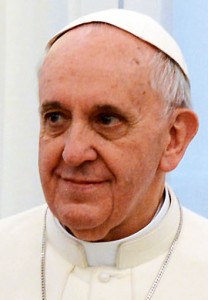how far does pope francis’ benevolence extend?
In an unprecedented move, the new Pope Francis has stated that Catholics should show compassion toward their fellow man, even if that man is homosexual, divorced, or, even a woman. In an interview with an Italian Jesuit journal, La Civilta Cattolica, the Pope was asked how Catholics should behave towards those who are divorced or remarried or gay.
‘I used to receive letters from homosexual persons who are “socially wounded”, because they tell me that they feel like the church has always condemned them,’ he answered. ‘But the church does not want to do this… A person once asked me, in a provocative manner, if I approved of homosexuality. I replied with another question: “Tell me: when God looks at a gay person, does he endorse the existence of this person with love, or reject and condemn this person?” We must always consider the person … In life, God accompanies persons, and we must accompany them, starting from their situation.’
For some reason, this attitude of support and love towards one’s fellow man, which I understand to be taught extensively in the New Testament, and which does in fact constitute one of the fundamental tenets of Christianity, has caused some surprise among a mainstream press who are used to the Pope’s predecessors’ approach of condemnation towards those who do not follow selected passages of Leviticus to the letter.
However, this is exactly the kind of reform the Catholic church is going to need to make if it wishes to remain relevant into the Twenty-First Century. In the light of dwindling church attendance and increasingly vocal exasperation and scepticism towards religion in general from mainstream society, Pope Francis, whose real name is Jorge Mario Bergoglio, was elected in March. He is an Argentinian of Italian descent who, he says, has ‘never been a right-winger.’ It was hoped upon his election that he would bring the Church more in line with societal values and it looks that he is following through with this mandate to a certain extent. His views are certainly more palatable to a liberal society than those of his immediate predecessor, the conservative Benedict XVI, who was dogged by Hitler Youth connections and allegations of child abuse cover-ups.
Sadly, though unsurprisingly, Pope Francis’s liberalism only extends so far. When asked about the role of women in the church, he said that he felt wary of something he termed ‘female machismo’, because ‘women have a different make-up from men.’ However, he added, without making any concrete steps towards reform, that he wanted to ‘investigate further the role of women in the church’ and said that ‘The feminine genius is needed wherever we make important decisions.’
The 11,000 word interview also delves into the Pope’s personal interests and tastes, including his love of art, his favourite books, and his decision to sleep in Room 207 in the informal Casa Santa Marta in the Vatican, instead of the papal apartment in the Apostolic Palace, because ‘It is big and spacious, but the entrance is really tight. People can come only in dribs and drabs, and I cannot live without people.’
According to the 2011 Census, 25.3% of Australians identify as Catholic; however, the Catholic Schools Association 2011 survey found that only 12.5% of Catholics, or 0.03% of the Australian population, attend Mass every Sunday – a figure which it notes has been dwindling since the 1950s.


